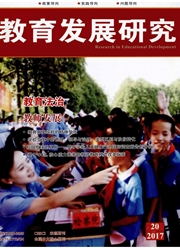

 中文摘要:
中文摘要:
高校毕业生就业质量是近期研究的热点问题之一。考虑到高职院校与普通本科院校人才培养目标的不同以及个体就业观念的差距,本文提出应该横向比较本科与高职毕业生就业观念和就业结果的差异,同时纵向比较高职毕业生的就业观念与其实际就业结果的差异,以此说明高等职业教育对就业质量的影响。利用上述方法,本研究发现本科和高职毕业生的就业观念迥异,高等职业教育对毕业生的就业观念和求职结果具有显著影响,且高职毕业生的就业观念能显著改变其求职结果。通过横向和纵向比较,本文发现高职毕业生的就业质量未必显著比本科毕业生差。
 英文摘要:
英文摘要:
College graduate's employment quality is one of the most heatedly discussed issues recently. Giving the difference in purposes of talent cultivation in academic and vocational institutions and the difference in individual job-searching strategy, this paper proposes that scholars should compare the difference of job-searching strategy and the gap in actual employment outcome between academic and vocational college graduates and analyze the level of compatibility between vocational graduate's job-searching strategy and their job-searching result, in order to identify the effect of vocational higher education on employment. Using the proposed method, this study finds a great gap in job-hunting strategy among two types of graduates. Vocational higher education significantly affects one's job-hunting strategy and employment result. Besides, vocational graduate's job-hunting strategy indeed influences their employment outcomes. In conclusion, this paper believes that vocational graduates' employment quality is not necessarily worse than that of academic graduates.
 同期刊论文项目
同期刊论文项目
 同项目期刊论文
同项目期刊论文
 期刊信息
期刊信息
